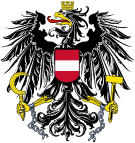
The politics of Austria take place in the framework of the federal parliamentary republic of Austria, with a President as head of state, and a Chancellor as the head of government. Governments, both local and federal, exercise executive power. Federal legislative power is vested both in the Federal Government and in the two chambers of Parliament; the National Council and the Federal Council. The Judiciary of Austria is independent of the executive and the legislature.

Styria is a state, or Bundesland, located in the southeast of Austria. In area it is the second largest of the nine Austrian federated states, covering 16,401 km2 (6,332 sq mi). It borders Slovenia and the Austrian states of Upper Austria, Lower Austria, Salzburg, Burgenland, and Carinthia. The capital city is Graz which had 276,526 inhabitants at the beginning of 2015.

The Greens – The Green Alternative is a political party in Austria.

Josef Klaus was an Austrian politician of the conservative People's Party (ÖVP). He served as State Governor (Landeshauptmann) of Salzburg from 1949 to 1961, as Minister of Finance from 1961 to 1963 and as Chancellor of Austria from 1964 to 1970.

Parliamentary elections were held in Austria on 6 March 1966. The result was a victory for the Austrian People's Party (ÖVP), which won 85 of the 165 seats. Voter turnout was 93.8%. With an outright majority of three seats, the ÖVP could govern alone. Nonetheless, ÖVP leader and Chancellor Josef Klaus initially sought to continue the grand coalition with the Social Democratic Party of Austria (SPÖ) that had governed since 1945. When talks for a renewed coalition failed, Klaus formed an exclusively ÖVP cabinet, the first one-party government of the Second Republic. It was also the first purely centre-right government in Austria since before World War II.

The 2006 general election for the National Council in Austria was held on 1 October 2006.

Alfons Gorbach was an Austrian politician of the conservative People's Party (ÖVP). He served as Chancellor of Austria from 1961 to 1964.

The Tyrolean state election of 2008 was held in the Austrian state of Tyrol on 8 June 2008, brought forward from the original date of 5 October 2008 to "avoid collisions with a possible early parliamentary election". Apart from the Austrian People's Party, the Social Democratic Party of Austria, The Greens – The Green Alternative and the Freedom Party of Austria, the president of the Tyrolean branch of the Austrian Chamber of Labour Fritz Dinkhauser contested the election with a new party called Bürgerforum Tirol, although initially considered likely to be called Für Tirol, to break the hold of the conservative, farmer-dominated Tyrolean ÖVP on the state ; Fritz Gurgiser of the Transitforum Austria-Tirol will run on Dinkhauser's list. The federal ÖVP has clearly stated its refport for the incumbent Landeshauptmann Herwig van Staa. The Alliance for the Future of Austria planned to contest the election in a joint list with another split from the FPÖ under the name "Alliance of Free Tyroleans". On 24 April 2008, it was reported that this list might fail to gather the necessary signatures to contest the election, as the BZÖ suddenly decided not to run under the list's name. The chairman of the FPT Willi Tilg stated on 2 May 2008 that the party would not contest the election, despite the fact that he claimed they had gathered the necessary signatures; Tilg called on voters to vote for the incumbent governor van Staa instead. Thanks to the unexpected refport of the Greens, the Communist Party of Austria will be able to contest the election in all of Tyrol.
The European Parliament election of 1996 in Austria was the election of the delegation from Austria to the European Parliament in 1996.
Christian Buchmann is an Austrian politician and Member of the Styrian Parliament.

Snap legislative elections were held in Austria on 28 September 2008 to elect the 183 members of the National Council. The elections were caused by the withdrawal of the Austrian People's Party (ÖVP) from the governing grand coalition with the Social Democratic Party on 7 July 2008. Due to dissatisfaction with the grand coalition and the two main parties, it was widely expected to be a realigning election, with gains for the opposition and up to seven parties were expected to win seats.
The political parties used numerous campaign posters in the 2008 Austrian legislative election.

The Freedom Party of Austria is a right-wing populist and national-conservative political party in Austria. The party, led by Heinz-Christian Strache, is a member of the Europe of Nations and Freedom group in the European Parliament, as well as of the Movement for a Europe of Nations and Freedom.

Legislative elections were held in Austria on 29 September 2013.

Legislative elections were held in Austria on 15 October 2017. The Austrian People's Party (ÖVP) emerged as the largest party in the National Council, winning 62 of the 183 seats. The Social Democratic Party (SPÖ) finished second with 52 seats, slightly ahead of the Freedom Party of Austria (FPÖ), which received 51 seats. NEOS finished fourth with 10 seats, and PILZ entered parliament for the first time and came in fifth place with 8 seats. The Green Party failed to cross the 4% threshold and was ejected from parliament, losing all of its 24 seats.

The Salzburg state election of 2018 was held in the Austrian state of Salzburg on 22 April 2018. A total of 9 parties contested the election. For this, they had to collect 100 valid signatures of eligible voters in each of the 6 districts, or the signatures of 3 members of the state parliament. All parties except the KPÖ+ and CPÖ were on the ballot statewide, the KPÖ+ only in Salzburg-Stadt and Salzburg-Umgebung and the CPÖ only in Salzburg-Umgebung. Team Stronach and the Pirate Party of Austria decided not to participate in the election.

Juliane Bogner-Strauß, is an Austrian molecular biologist, biochemist, and politician in the Austrian People's Party (ÖVP). Since October 2013 she is Associate Professor at the Institute of Biochemistry of Graz University of Technology. From 18 December 2017 she was Federal Minister for Families and Youth of the Republic of Austria, since 8 January 2018 she is Federal Minister for Women, Families and Youth in the Federal Chancellery. Since 9 July 2018, she is the Federal Minister for Sustainability and Tourism.


















